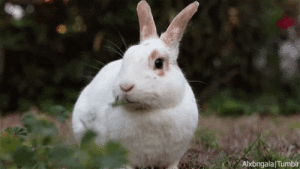Rabbits are known to live upto 10 to 12 years under constant care & love from its human family. The most important element of caring for the bunny is a healthful daily diet that must be a combination of fresh-dust free hay, vegetables, fruits, pellets and clean drinking water.
What makes a Nutritious Diet for rabbits:
Dust free hay is the core component of any rabbit’s daily food intake. Veterinarians recommend offering a diet to the pet rabbit that constitutes 70 to 80 percent good quality fresh hay such as timothy, orchard oat, and other varieties of grass hay.
Hay is closest to what a rabbit would forage in the wild and comes with a string of benefits:
- A diet rich in hay means the pet is getting sufficient fiber that prevents formation of hairballs.
- Chewing on hay helps to trim down a bunny’s front as well as cheek teeth that grow constantly, this is also known as dental abrasion. Overgrown teeth are a sign of poor dental health and can directly affect a rabbit’s overall health.
- Another advantage of chewing hay is that it prevents boredom by satiating a bunny’s inborn urge to graze & gnaw.
- Alfalfa hay is very rich in protein & calcium and especially benefits babies, nursing females, ailing and old rabbits.
Before you retire to bed at night make sure hay is available to it.
Fresh vegetables - A minimum of one cup of vegetables for every 4 pounds of rabbit’s body weight can be given daily. This will encourage healthy chewing behavior in your furry buddy along with supplying necessary health benefits
Washed green leafy herbs and vegetables must be given daily to the pet rabbit.
Safe vegetables for rabbits are peas, spinach, fenugreek, cucumber, green beans, cauliflower & its leaves. Since carrots are high in Sugar, should be given in moderation.
Some safe herbs include Coriander, Basil and Mint.
Learn what vegetables must be avoided:
- Certain Lettuce varieties especially ice-berg lettuce must be avoided as they can be damaging to its health.
- Even cabbage can be avoided as it can cause gas and digestive upsets.
- Radish tops, Broccoli, Brussel sprouts must be given sparingly else will lead to a gassy stomach.
- Bunny Friendly Fruits - Fruits should not be fed in excess due to their rich sugar content. Daily fruit intake should be limited to 2 tablespoons for a rabbit.
Sugary foods such as carrots, banana, pineapple etc. should be given in small quantities. Image - animalstime.com[/caption]
What are safe fruits for rabbits and the right way to serve them?
- When offering apple only give the juicy flesh and no pip as it is poisonous.
- The seeds and plant of cherries are poisonous as it contains cyanide, therefore be careful to only feed the soft flesh.
- Banana
- Melon ( without seeds)
- Mango
- Papaya
- Kiwi fruit.
- Pineapple ( skinned and in very small quantities)
- Pear (sans the seeds)
A word of caution: It’s best to remove the pips, pits, and plants of fruits before offering to house bunnies.
-
Commercial Rabbit pellets/nuggets must form only five percent of your rabbit’s daily diet.
Commercial pellets are rich in minerals and vitamins including vitamin D. However only feed one egg cup of pellets per kilo of your rabbit’s weight. But remember not to feed this quantity in one go. Giving a rabbit more than required quantity of pellets will prevent it from consuming enough hay. Over-eating pellets leads to weight gain in rabbits. The muesli-style foods must be given sparingly as they may increase the risk of dental and tummy troubles.
Clean drinking water is an important element of a rabbit’s diet that needs to be constantly present.
Check throughout the day and refill its bowls whenever the need arises. Without water a bunny can get very ill. Image- smallpetselect.com[/caption]
Rabbits are especially active during early morning and evening time so the owner can offer food to the pet during these periods. Never serve your rabbits the entire prescribed daily food quantity (vegetables + fruits + pellets) all at once. Hay must be constantly present for the bunny.
Also monitor the pet’s daily eating and drinking habits. Any change in these should prompt you to consult a vet.

